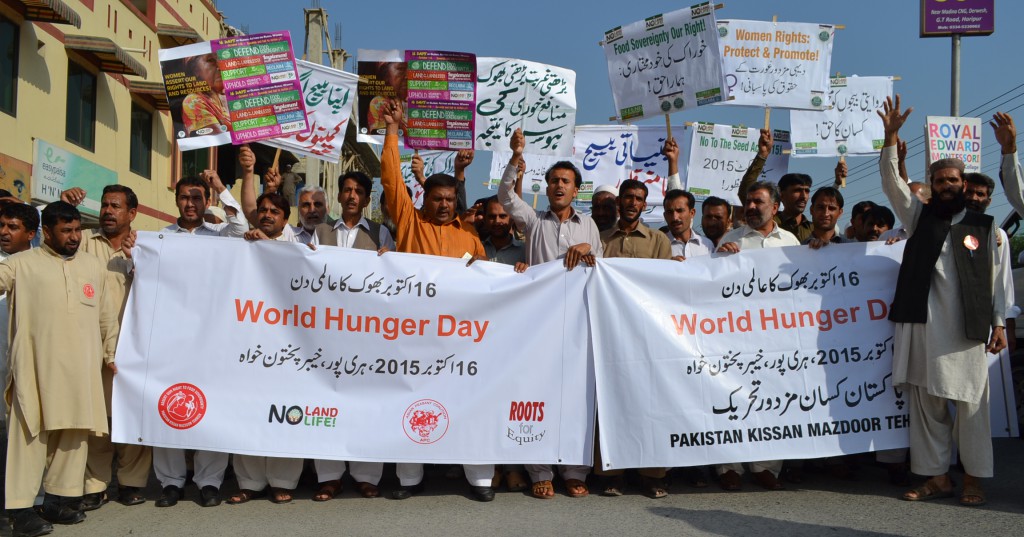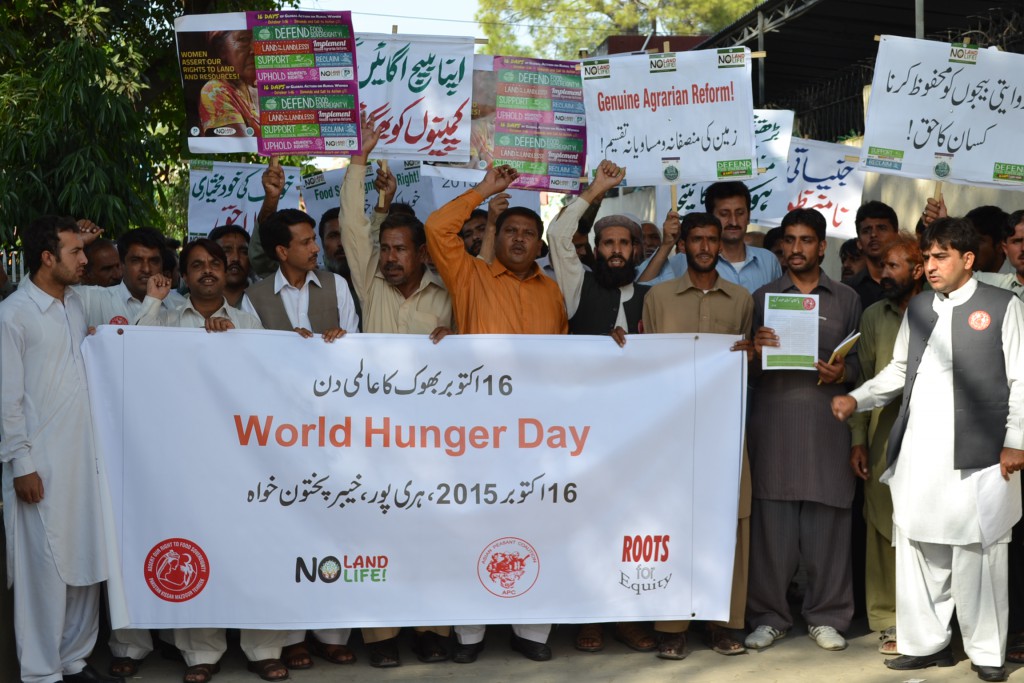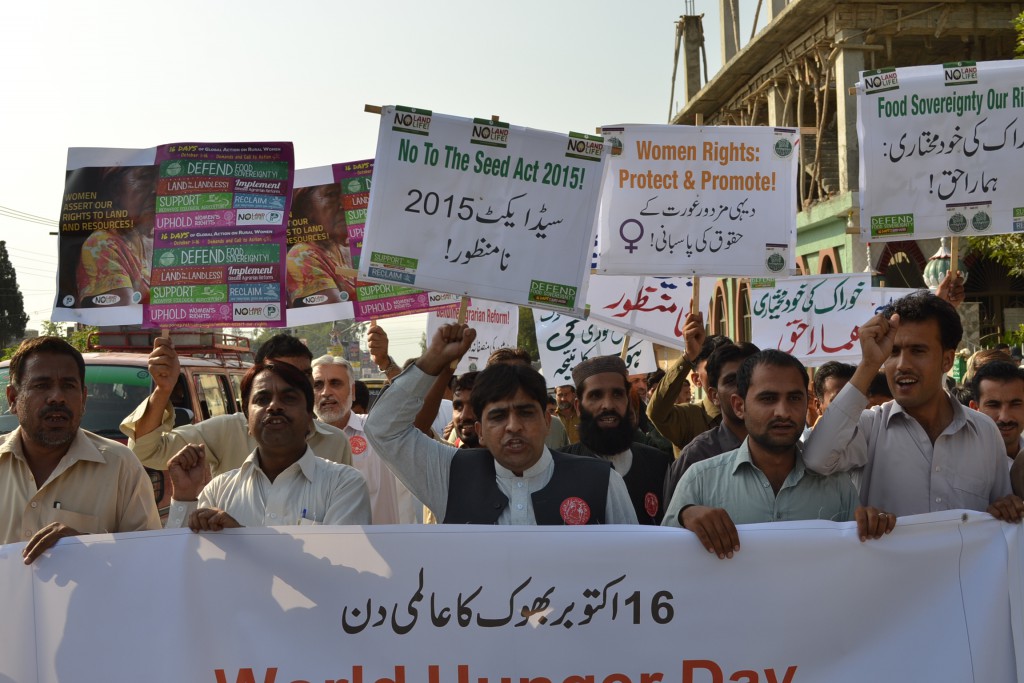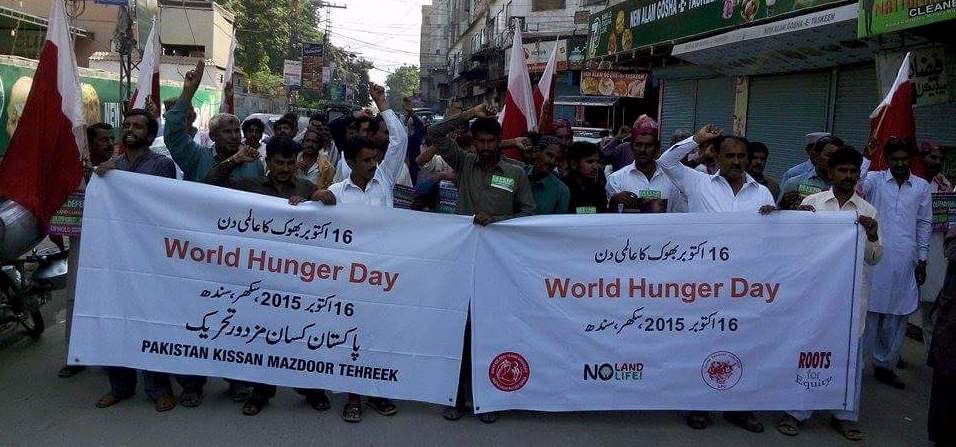October 16, 2015
World Hunger Day (Press Release)
The UN’s Food and Agriculture Organization (FAO) has been celebrating 16 October as World Food Day from the past 70 years. This year it’s slogan for the World Food Day is “Agriculture and Social Security.”
Pakistan Kissan Mazdoor Tehreek (PKMT) and Roots for Equity along with other farmer movements and organizations like the Asian Peasant Collision (APC) and Pesticides Action Network (PAN AP) observers the World Food Day as World Hunger day. Even today, 60% of Pakistani population does not have food security, whereas 50% women suffer from anemia. In Pakistan 35% of small children die from malnutrition, and 50% of children less than 5 years suffer from stunting.
For the World Hunger Day, PKMT had organized a protest in front of the TMA Hall, Haripur, Khyber Pakhtunkwa. Various PKMT leaders including Raja Mujeeb, Tariq Mahmood, Fayaz Ahmed, Altaf Hussain and Wali Haider spoke against the prevailing hunger in the country. It is a bitter truth that in an agricultural country like Pakistan, farmers are facing hunger because more than 70 percent of them are landless. Landlessness and exploitation of farmers is entrenched in the semi-feudal structure of the economy and encroaching capitalist policies. Land grabbing through government support for corporate agriculture is increasing across the country.
Climate change is also a critical reason behind increasing hunger and food insecurity. The carbon emissions from industrial production in capitalist economies are a prime reason for Pakistan being one of the most vulnerable countries impacted from climate change. In the previous years, farmers have been facing debilitating economic loss due to yearly floods causing destruction of crops and loss of livestock. Tharparkar is facing acute drought that has killed thousands of children and livestock. Almost 40 percent of the population has had to move in search of food and livelihood.
The elitist Pakistani government in collusion with International organizations, first world governments and the hegemonic international corporate sector are promoting trade liberalization. An example is the approval of the Seed Amendment Act 2015 that protects the interests of the agro-chemical corporations and allows the spread of genetically modified seeds in the country. The approval of this draconian law will take away the right of farmers to save and develop seeds: in this scenario how can they ensure food security in the country? Neoliberal policies have already pushed small and landless farmers into debt making them dependent on agro-chemical corporations. The increased production prices have pushed many farmers to migrate in search of other livelihood.
Pakistan is being forced to accept alternate fuel technologies. These include agro fuel crops such as sugar cane and maize; large tracts of land are being used for installation of solar and wind energy projects. All of this will lead to further shortage of land and food and can only exacerbate hunger!
Pakistan Kissan Mazdoor Tehreek and Roots for Equity demand an end to Feudalism and Corporate Farming. In order to attain food sovereignty and sustainable agriculture it is critically important that equitable distribution of land amongst small and landless farmers is carried out. In addition, all decision making and implementation of agriculture policies must be in the hands of small and landless farmers!
PKMT and Roots also hold a protest in front of Sukkur Press club, Sindh on the eve of World Hunger Day on 16th October, 2015. PKMT leaders Ali Gohar, Ali Nawaz, Hakim Gul, Mohammd Azim, Gul Hassan spoken to the protest and highlighted the issue of small and landless farmers in Sindh. They demanded Genuine Agrarian Reforms and also rejected the recently passed Seed Amended Bill 2015.
Released by: Pakistan Kissan Mazdoor Tehreek and Roots for Equity





